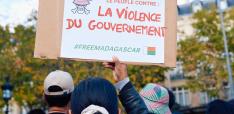Resetting the Moral Compass

Failures in moral leadership questions the nature of humanitarian engagement with power. Alasdair Gordon-Gibson argues that its compass must direct towards a path of participation that is relevant to the people it aims to protect.
The abuse of state and non-state authority in so many situations of violence around the world, including Ukraine, Israel, Palestine, Sudan, Myanmar, Afghanistan, the Democratic Republic of the Congo and Haiti, has led to growing public outrage over the failure to protect civilians and vital civilian infrastructure, and the cynical co-option of the humanitarian identity to give semblance of a caring international response. Earlier responses calling for a power shift to correct a dysfunctional humanitarian system need to direct towards more forthright, less cautious approaches to identifying the abuse and naming the abusers. Without a clear moral stance that is in solidarity with the lived realities of populations in crisis, the humanitarian identity is seen as no more than an empty tool for political transaction and manipulation. Urgent solutions need to be found on how to restore trust in a rules-based international order and where institutional leadership in the humanitarian sector catches up with the moral direction of the people it seeks to represent.
In a recent piece for Global Policy, Liana Ghukasyan urges the humanitarian to recognise that moral justice does not emerge from a dogmatic application of principles but requires recognition of the complexities of each context where abuse and injustice occurs. This is echoed by Aarathi Krishnan who calls for the sector’s recognition of its agency and accountability in the political contexts of its action. Many working in the humanitarian sector consider the principles of neutrality, impartiality and independence as being an essential and pre-existing part of the expression of ‘humanity’ and are universally applicable regardless of context or culture. However, to many analysts, they were established – like the organisations themselves – at a particular historical juncture and so may represent an ethos that is questioned or rejected by stakeholders outside of their foundational traditions. Altered structures in the environment of humanitarian action have meant that entrances and exits to this discursive space have been re-situated, leaving dislocated narratives echoing inside a chamber whose construction was formed by an architectural plan determined by, and contingent on, the authority and exclusive discourse of its original designers. To regain relevance in this revised space requires confident engagement with the prevailing context of humanitarian action. This means acknowledgement of the political identity of the humanitarian sector, and recognition of its social agency: it’s interface with established and non-established power.
Scholars of Social Identity Theory have observed that people’s orientation towards authorities change once they have established a social bond, meaning that incorporation into the social fabric of public life increases the likelihood of a more considered interpretation of the intent of authority and its auxiliary structures. The construction of social capital, and its associated features of trust, norms of behaviour and mutual obligation, have been linked to an emergence of community participation, where voluntary engagement with state or non-state authority is seen to be a product of shared values and a culture of responsibility to one’s community and society. It will be through navigating the complex pathways towards a less simplistic engagement with power and authority that a more relevant and robust humanitarian access can be secured. Key to this will be ‘voluntary participation’ in a divided and contested space.
Voluntary service: a universal identity of support and collaboration
Documents in the archives of the International Committee of the Red Cross (ICRC) chart Red Cross and Red Crescent Movement debates in preparation for the formal declaration of its Fundamental Principles in Vienna, in 1965. These present a vigorous discussion around the principles of Voluntary Service and Universality, which impact the formulation of the principles of Neutrality, Impartiality and Independence. Most notable in this debate are differing interpretations of Independence and Neutrality, and the shared urge to retain the core value of Voluntary Service as a guide towards the overarching principle of Humanity. This means the legitimation of a space where the humanitarian is recognised as a support to authority but can challenge it if humanitarian norms are breached.
There is history of a legitimated identity to question and challenge authority that shares a common genealogy stretching from Europe to the Middle East and beyond. The traditions and politics are different, but there is a universal expression of dignity and respect, and the voluntary impulse to protect these values, that is common to all. To craft this space for discourse, we need a new way of thinking – one that complements the new way of working endorsed at the World Humanitarian Summit in 2016, but which does not delegate responsibility to the local while maintaining the dominant discourse of exceptionalism.
Having access to the discourse and playing an influential part as a trusted challenge to authority is not absent from the contemporary humanitarian environment, but until recently it was seldom acknowledged. Practical examples are evident when local actors and national politicians choose to resist authority – or are auxiliaries to authority but have access to opposition discourse as a trusted participant, such as during the conflict in Syria, when Red Crescent volunteers and others were able to work in areas not controlled by government. Key to this is the notion of a voluntary space, offering a freedom of choice, where one can select being in or out – one that is capable of universal expression.
The documents in the ICRC archives show how critical the formulation of these two concepts were in the formation of the Movement’s identity and its Fundamental Principles. Opinions among the working group appointed to prepare their declaration at the Vienna Conference in 1965 show a more passionate and consensual debate around notions of voluntary service and its universal expression than around the other principles being discussed. Replies from the Movement’s National Societies who responded to the draft wording for the principles proposed by the working group coalesce around two concepts: (i) the voluntary spirit of the founding doctrine and its emerging principles that question how prescriptive the original motives behind the humanitarian identity are to be considered and (ii) given the differing social and political environments, how each society might have the capability to share in a mutually supportive and universally accepted space for its humanitarian action. This emphasises the reality that context matters and that a dogmatic prescription of rules and procedures neglects the reality of people striving to survive in a crisis. The eminent Swiss jurist and a past Vice-President of the ICRC, Jean Pictet, captured this when he defined each principle as ‘a rule, based upon judgement and experience, which is adopted by a community to guide its conduct’ (4).
Exploring new narratives around IHL: solidarity and shared humanity
As regards International Humanitarian Law, there is worldwide support for the normative system of the Geneva Conventions, but as the former President of ICRC remarked in an interview, there needs to be a new way of articulating the needs of affected populations that directs the discourse towards pragmatic engagement with all stakeholders in the environment of complex emergencies where humanitarian principles define clear boundaries and redlines that cannot be compromised. This fresh narrative will lead towards a new direction and a different type of (humanitarian) consciousness. It will be a period of exploration, engaging a broader platform of stakeholders, including the international, regional, national, and sub-national. Reports of experience from the field in Myanmar following the cyclone of 2008, when humanitarian response engaged with a tri-partite agreement between the UN, the government of Myanmar and ASEAN, supported by national society volunteers and local NGOs, presents a practical example of humanitarian cooperation in the most contested of environments.
Mistrust and disappointment with the global political responses to conflicts and complex emergencies, where a sense of humanity is seen as a diminishing concept in humanitarian responses, has led for increasing calls for solidarity with affected populations. Disenchantment with political authority makes it more important than ever to engage with the political discussion, rather than distancing from it in the quest for absolute neutrality, impartiality, and independence. It means influencing political decisions in a forthright way that emphasises the ‘human’ in the humanitarian identity and promotes its social and its political agency: one that engages in a discussion that is less dogmatic and directs towards a space for discourse around an ordinary humanitarian society rather than an ordered humanitarian system.
Alasdair Gordon-Gibson. Honorary Lecturer, University of St Andrews, Graduate School for Interdisciplinary Studies. Author of ‘Humanitarians on the Frontier: Identity and Access along the Borders of Power’ (Bloomsbury, 2023). ‘Conflict and Development’ (third edition, Routledge 2024, co-authored with Andrew Williams).
Photo by Bakr Magrabi

